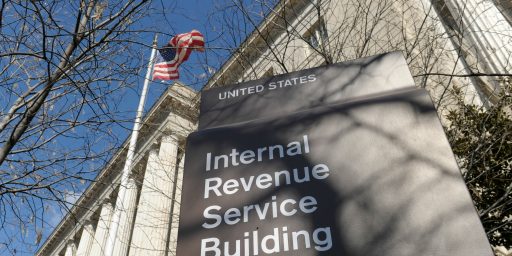No, Lois Lerner Did Not Waive Her Fifth Amendment Rights By Making An Opening Statement
As you can see in this brief clip from the opening of today’s House Government Oversight Committee hearing, IRS employee Lois Lerner’s decision to assert her Fifth Amendment rights rather than answer questions didn’t come without some degree of controversy:
Essentially South Carolina Congressman Trey Gowdy argued that, by making an opening statement in which she stated that she had not nothing wrong, Lerner had waived her Fifth Amendment rights against self-incrimination. Of course, Gowdy was wrong:
Gowdy’s outraged objection was met with applause in the courtroom. But James Duane, a Fifth Amendment expert at Regent University, says Gowdy’s claim was “extremely imaginative” but “mistaken.”
Had this been an actual criminal trial, in an actual courtroom, and had Lerner been an actual defendant, then yes, it would not have been permissible for her to testify in her own defense and then refuse cross-examination on Fifth Amendment grounds. But a congressional hearing is not a criminal trial in two important ways, Duane tells Daily Intelligencer.
First, unlike in a trial, where she could choose to take the stand or not, Lerner had no choice but to appear before the committee. Second, in a trial there would be a justifiable concern about compromising a judge or jury by providing them with “selective, partial presentation of the facts.” But Congress is merely pursuing information as part of an investigation, not making a definitive ruling on Lerner’s guilt or innocence.
“When somebody is in this situation,” says Duane, a Harvard Law graduate whose 2008 lecture on invoking the Fifth Amendment with police has been viewed on YouTube nearly 2.5 million times, “when they are involuntarily summoned before grand jury or before legislative body, it is well settled that they have a right to make a ‘selective invocation,’ as it’s called, with respect to questions that they think might raise a meaningful risk of incriminating themselves.”
\
In fact, Duane says, “even if Ms. Lerner had given answers to a few questions — five, ten, twenty questions — before she decided, ‘That’s where I draw the line, I’m not answering any more questions,’ she would be able to do that as well.” Such uses of selective invocation “happen all the time.”
The solution to all of this, of course, is that the committee can give Lerner, or anyone else for that matter, immunity so that they could testify without fear that their testimony could be used against him. This type immunity, called transactional or use immunity, does not mean that someone cannot be charged criminally but it does mean that their testimony could not be used against them. This is the same type of immunity that was granted to Oliver North and others during the Iran/Contra hearings in 1987. So, in essence, the ball is in the Committee’s court at this point.





A blustering Member of Congress in the midst of staging a pointless PR circus screws up basic legal procedures? The Deuce you say!
A South Carolina politician says something stupid, even crazy?
I’m sure that’s NEVER happened.
South Carolina lives up to its reputation again.
I’m also sure that the committee isn’t going to give transactional immunity. They’ll reap far greater political rewards having her invoke the Fifth in response to grandstanding “questions.”
Gowdy was sick the day they taught law at law school. The University of South Carolina School of Law must be so proud.
Why not just stick to the legal facts and not turn this into personal attacks.
You can plead ‘the fifth’ if you haven’t been formally accused of a crime?
@stonetools:
Lerner isn’t the fish they want. Sarah Hall Ingram is, for starters.
@mantis:
Trey Gowdy is a ex-prosecutor. I believe their default position is that you have waived your Constitutional Rights.
You are missing the the beginning of Representatives Gowdy’s statement. He started with this qualifier, If we are going to run this hearing like a court room, like representative Issa and representative Comings have suggested, then…(now insert the quote that you are missrepresenting).
@He_Has_Failed:
Of course you can
Well, doesn’t have to be as cut and dried as this post makes it out to be. People get tangled up in procedural rules all the time depending on context, what the proceeding is and their relationship to it. When invoking the 5th amendment in a formal setting, you can’t assume you know what is permitted and what isn’t. You need a lawyer familiar with invoking in that context or you can get all tangled up. It’s the law, logic doesn’t apply.
The operative part of my former colleagues quote was ‘if we are running this like a courtroom ()’. If anyone is wondering why Mr Mataconis is writing articles rather than sitting in a court room, here it is.
Lawyer is the most common former profession of congress critters…
Are the rules different if testifying before Congress? (I don’t see how, but Congress is weird.)
I do not see how giving an opening statement waives her rights. I spent almost 10 years in law enforcement (as a staffer) and my understanding has always been that you can clam up any time you want – even after answering a dozen questions under interrogation.
But one of you lawyers answer for me: suppose the police ask permission to search your home, and you permit them to start. Can you revoke that permission when you see they are getting close to your drug stash? Can you say, “I am now invoking my fourth amendment rights?” and demand them to leave?
I don’t know the answer to that, but I am wondering if that is a corollary to what they are saying about Lerner.
But right now I am thinking she could have given any kind of statement she wanted to the committee and then invoked her rights, exactly as she did. But something tells me there is more to it than that and I don’t know what.
@Donald Sensing:
Sure you can, but if they don’t leave, what recourse do you have? It’s you against one or two or more testilying cops. You lose. You were stupid for giving permission in the first place (drug stash or not). You don’t know what is in your home that can get you screwed. And if you are real stupid and try to stop them, then you might get lucky and just be arrested, but you might get dead or beaten before your arrest.
But you should try to revoke, politely. Your lawyer might be able to do something with it. Or you might have cops that know and respect the law.
My understanding is the rules for invoking the 5th when testifying are tricky. Lots of jurisdictional technicalities of when you’ve de facto waived dependent upon past rulings. Either give nothing but your name before invoking or have a good lawyer.
As has been stated, if the proceeding wants, they can give you immunity for your testimony, which by the way removes any right to remain silent or not incriminate.
BTW, interesting. The journollist leaders have a quiet meeting at the White House, then suddenly are all on the same page about hanging Lerner out to dry. Interesting, very interesting.
Actually, apparently, there is some dispute over whether she did or not.
She does seem to have gotten herself some legal expenses since this could end up before a judge.
And Andrew McCarthy points out what Lerner did is a old trick. Unfortunately, Issa wasn’t prepared for it.
Alan Dershowitz thinks she screwed the pooch…
http://www.newsmax.com/Headline/lerner-irs-held-contempt/2013/05/22/id/505922
Oh of course the old “I was on UTube so I must be an expert rule. Dershowitz is not a conservative’s best friend and he totally disagrees with this assertion made here by James Duane. l the way to the supreme court on just this issue.
And oh “where the heck is Regent College?”
JKB…instead of having some spine and admiting that he/she is wrong…AGAIN…links to a far right wingnut site that thinks the Congress is the same as a court of law.
Typical wimpy Republicanist.
@Sam Malone: Wow, it’s another of the Cheers gang!
So far, JKB has cited noted GWU Law Professor Orin Kerr and the infamous Harvard Law Professor Alan Dershowitz, you jackhole — both of whom contradict Attorney Mataconis’ unequivocal assertion.
The argument is that Lerner started to testify, made some very unequivocal statements, and then refused to answer any questions about those statements. By testifying voluntarily and offering information, she opened the door for more questions.
Kerr says that it’s certainly arguable, and Dershowitz goes further in saying that she did forfeit her 5th Amendment rights by making that statement.